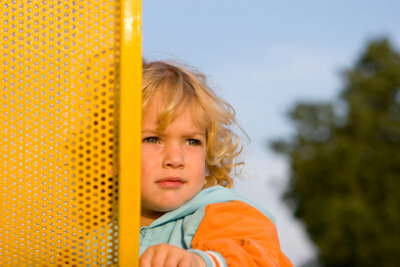Child does not want to go to kindergarten
Does your child not want to go to kindergarten? What is the problem behind this? Feel that the thoughts go straight to the child, such as: B. Separation anxiety, belated strangers, fears, etc.? Of course, that needs to be highlighted. But first look to yourself. Why is it important to you that your child goes to kindergarten? How much inner pressure do you feel that you should finally go to kindergarten? How much trust do you have in the kindergarten team? Children feel very precisely with which feelings, sensations and attitudes you bring it to kindergarten and it is possible that “transmissions” advance to a kindergarten strike.

If a child does not want to go to kindergarten, there are reasons
- Every year there are new ones in the kindergartens children recorded. For the teachers of the facilities, the “integration” of the “newbies” begins anew. Depending on the composition of the group, more than half of the new children can be accepted into some groups and less than half into others. For the responsible educator, this means a serious cut in his work. The now six-year-old, school-age “big ones”, who have already got used to it, leave the group and the three-year-old, unknown “little ones” come
- Professional “educators” also have specific characteristics that imperceptibly react to changes. Factors such as B. Many years of experience in the same facility, age of the educator, balanced, irritable or tense personality and much more influence the work in the kindergarten group. While a six-year-old has learned the personality of the responsible group leader without Accepting self-reference is something the “new” three-year-old child “does not feel” with the finest “senses” familiar ”.
- Parents who have cared for their children at home for three years are happy that the child is now big enough to be in the kindergarten to go. Hopes that your child might make new social contacts and receive new learning opportunities encounter a still unknown dimension with the three-year-old. The child feels “demands” coming up that it cannot assess. Sometimes there is also pressure behind the longed-for “start of kindergarten” when parents, for example, B. need “child-free” periods for financial reasons in order to be able to pursue their job. At that moment the child feels the inevitable requirement to face the unknown situation.
- The more and more awakening personalities of the three-year-olds are very different. Parents will know whether their child is predisposed to be more anxious, more reserved, braver, more courageous, more deliberate, more independent or in search of help. This gives parents an advantage over educators. The pedagogical attitude of many professional educators that children stop crying when they start kindergarten once their parents are gone may be true for many. But not with all. So the question is what to do if a child suddenly no longer wants to go to kindergarten from the outset or later, after weeks
A child doesn't just want to "stress"
- When your child has learned how to communicate how they are doing in certain situations, they will too. In the case of a three-year-old, very simple sentences can give clues such as: "I don't want to - stay with mom" or "I don't want to - stay at home". At that moment, it could be a "separation anxiety" with regard to the unknown persons or act in the unfamiliar environment that the child senses. The level of intensity behind this can be learned by educators and parents within a few days. With some children, this first "fear of separation" disappears relatively quickly as soon as they feel they have been welcomed by friendly, friendly people in a new, beautiful environment
Children usually love any kind of activity, such as playing, doing gymnastics, painting, etc. …
- A child usually reacts quite honestly and the answer could also be: "I don't want to go to kindergarten - that's stupid". There can be many reasons why your child calls kindergarten “stupid”. It is questionable whether a three-year-old child differentiates exactly who or what is "stupid" at and in kindergarten, but your questions about who or what is "stupid" can draw attention. The child will consider your question. It may nod at all of the answers offered, such as: B. "are the Games stupid - or the chairs? ”Nevertheless, such a question-and-answer argument will lead to your child wondering what exactly he means by“ stupid ”. It may well be that much later it can tell you what it thinks is "stupid". In any case, the child intuitively senses that something is not doing him well
Walk the path together with your child
- If your child doesn't want to go to kindergarten to talk to them, try to find their own inner peace. Try to find out if they are separation fears or integration problems.
- Accept your child's answer and clarify with the responsible group leader whether or not there have been incidents whether you can agree on “compromise times” in terms of shorter ones when it comes to the start of kindergarten Residence times.
- In the event of integration problems, you should try to find out whether your child has contact problems, quarrels, fears or whether they need longer periods of acclimatization. Clarify with the responsible educator what supportive measures you can offer from home.
- Keep in touch with your child by showing them that you have a hearing for their problems, that it can't just stay at home, because there is so much more to experience than just your own Nursery. Guide your child who has problems (e.g. B. Disputes with children) can be resolved.
How helpful do you find this article?


